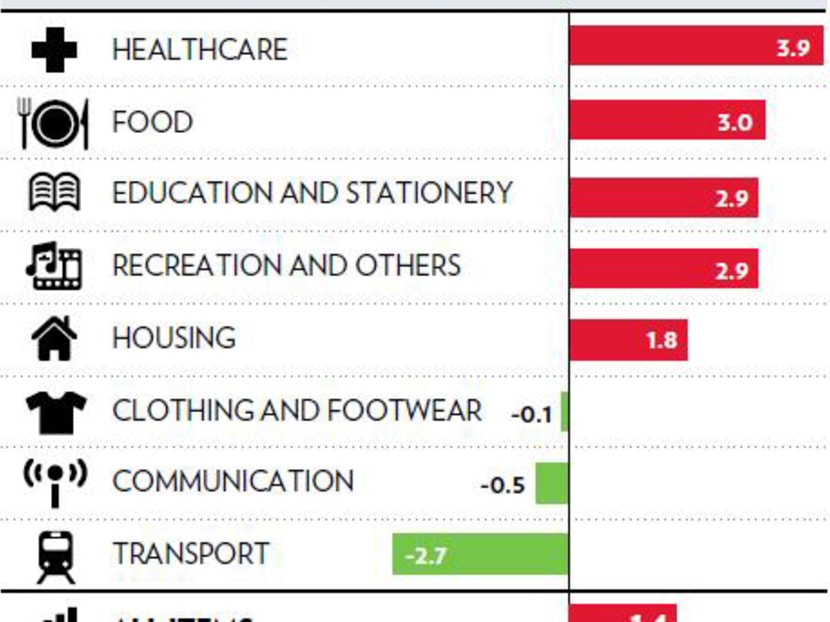COE declines help inflation to near-four-year low of 1.4%
SINGAPORE — A moderation in private road transport costs helped drive headline inflation to its lowest level in nearly four years last month, but the apparently benign data masked an increase in the prices of services and food.

SINGAPORE — A moderation in private road transport costs helped drive headline inflation to its lowest level in nearly four years last month, but the apparently benign data masked an increase in the prices of services and food.
All-items inflation slowed to 1.4 per cent on-year last month — its lowest point since February 2010 — from 1.5 per cent in December, helped by the decline in private road transport costs as Certificate of Entitlement (COE) premiums fell.
Private road transport costs fell by 3.5 per cent last month, following a 2.8 per cent drop in December.
But core inflation, which excludes private road transport and accommodation costs, increased to 2.2 per cent from 2 per cent in December, reported the Monetary Authority of Singapore and the Ministry of Trade and Industry in a statement yesterday.
The statement pointed the finger of blame for the increase in core inflation at the stronger rise in service costs and food prices.
Mr Irvin Seah, an economist at DBS, said the higher food costs probably stemmed from the Chinese New Year holiday and will probably ease from current levels, but service costs were likely to remain high.
“The tightening of the foreign labour policy is creating cost pressures among businesses, who are passing on these costs to the consumer,” he said. “Service industries have had to bear the brunt of these rapidly increasing manpower costs because the sector is relatively more labour intensive.”
Such challenges have been felt in sectors such as healthcare, which saw a 3.9 per cent on-year increase in costs last month.
“There are constraints on manpower — especially foreign labour — and this is putting upward pressure on wages and is one of the key reasons why healthcare costs have gone up,” said Mr Alvin Liew, Senior Economist at UOB.
Mr Seah said challenges such as these are going to keep core inflation at elevated levels for the rest of this year. “Core inflation could rise to 2.5 per cent by the middle of this year or maybe in the third quarter, driven partially by the build-up in labour costs.”
According to the official forecast, core inflation is projected to average 2 to 3 per cent this year.
And headline inflation may also increase as the year progresses as the impact of lower COEs wears off, said Credit Suisse analyst Michael Wan.
“The latest inflation figures indicate the current impact of government measures to curb car loans,” he said.
“But because the fall in transport costs resulting from that announcement mainly came in April last year, we believe headline inflation will be more pronounced in April this year, probably at around 3 per cent.”
All-items inflation is projected by the government to come in at 2 to 3 per cent this year.





